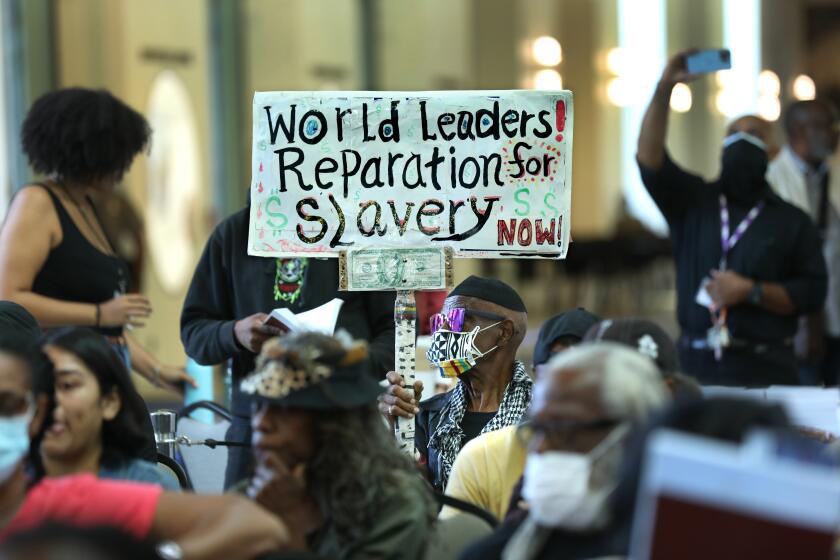Editorial: Reparations for slavery are overdue. California’s lawmakers must make them happen

That promise of 40 acres and a mule to freed Black slaves turned out to be short-lived and mostly unfulfilled.
An order signed by Gen. William Sherman, with President Lincoln’s approval two years after the Emancipation Proclamation, gave Black people what their community leaders said they most wanted: land. The order set aside 400,000 acres along the southeastern coast that had been confiscated from Confederate landowners. (The Army later offered up spare mules.) Thousands settled on the land, but three months after the order was signed, Lincoln was assassinated and his successor, President Andrew Johnson, a sympathizer with the South, overturned it, leaving most of the freed slaves with nothing.
That offer was as close as the federal government ever came to substantial reparations for slavery, one of the worst crimes against humanity in history.
Now, California has become the first state to present a detailed plan for reparations including dozens of policy changes as well as monetary compensation for its residents who can trace their lineage to a Black enslaved person or free Black person who lived in the United States before 1900. The Task Force to Study and Develop Reparation Proposals for African Americans released a final report Thursday to the Legislature that meticulously lays out a case for reparations.
It is a sweeping and ambitious attempt to address the enduring legacy of slavery in a place that people don’t often think of as having a slavery-corrupted history. But enslaved people were brought to California during the Gold Rush that began in 1848, and though the 1849 state Constitution banned slavery, there was no effort to enforce that ban. In fact, pro-slavery white Southerners held sway in the state Legislature, and state law allowed slave owners to capture enslaved people who had fled to this state.
State Sen. Steven Bradford wants to give Black people closed prisons in rural towns. It’s exactly the sort of weird plan that might move a wary Legislature.
A 2020 bill, written by California Secretary of State Shirley Weber when she was in the Legislature, created the nine-member task force to consider this history and the question of reparations. The group met for two years, held more than a dozen public hearings and heard from more than a hundred experts and individuals to help shape the more than 1,100-page final report.
The report alone is a significant achievement and offers a blueprint for other states and Congress to follow. But that’s not enough. The Legislature should seriously — and urgently — consider the report’s numerous recommendations, which include: a formal apology for slavery; monetary reparations; grants and financial assistance to help Black people buy homes and pay mortgages; free college tuition at California state schools for residents eligible for monetary reparations; and building more parks in Black communities.
The cost for most would be vast — but so are the losses of generational wealth and health suffered by Black people. Financial compensation for victims of horrific injustices is common. The German government paid billions in compensation to Holocaust survivors and individuals with Holocaust-related claims. The U.S. paid out more than $1.6 billion over 10 years to people of Japanese descent who were imprisoned during World War II.
In this case, reparations are intended to address the systemic racism that can trace its roots to the enslavement of Black people. The 13th Amendment, ratified in 1865, may have abolished slavery, but the institution quickly morphed into other forms of subjugation and white supremacy that are still affecting Black people today. “So thoroughly have the effects of slavery infected every aspect of American society over the last 400 years,” the task force wrote, “that it is nearly impossible … to include every piece of evidence or describe every harm done to African Americans.”
Generations of Black people have suffered discrimination in every imaginable sphere of life — housing, education, politics, employment, healthcare, in the criminal justice system and more. According to the report, African Americans who tried to vote or assert their rights through courts or in legislation were threatened with violence. The Ku Klux Klan set up local chapters all over the state of California in the 1920s.
The city of Palm Springs threw out hundreds of its Black residents in the 1960s and burned down their homes. The shameful chapter should be remembered and the families compensated.
The report paints a devastating picture of racism in the California housing market. Black people were relegated to certain towns or neighborhoods through the use of discriminatory zoning ordinances and federal mortgage policies. Thriving Black neighborhoods were demolished in the name of urban renewal. Government policies helped white Americans accumulate wealth while it put up hurdles to prevent Black people from doing that. “Federal and California Homestead Acts essentially gave away hundreds of millions of acres of land almost for free mostly to white families,” the report says.
Those policies have had devastating, lasting effects. “A 2014 study of the Los Angeles metro area found that the median value of liquid assets for native born African American households was $200, compared to $110,000 for white households,” the report says.
Reparations of some kind are in order for Black Californians today, and most Californians seem to agree. A poll by the Black Policy Project at the Ralph J. Bunche Center at UCLA found that 63% of Californians supported cash reparations — and even higher numbers supported other types of reparations.
The state’s lawmakers must start the difficult process of grappling with these recommendations — which ones to keep, which ones to adjust, which ones to cast out. What they should not do is put this report on a shelf and forget about it. It is past time to address the systemic atrocities of racism that have been inflicted on Black people for centuries. California is an excellent place to start.
More to Read
A cure for the common opinion
Get thought-provoking perspectives with our weekly newsletter.
You may occasionally receive promotional content from the Los Angeles Times.












